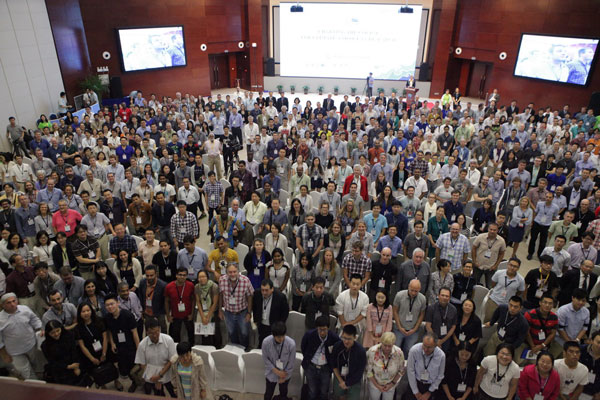China's role in ocean, climate change research growing
By Xie Chuanjiao and Hu Qing in Qingdao ( chinadaily.com.cn )
Updated: 2016-09-20
|
|||||||||
 |
|
Detlef Stammer, co-chair of CLIVAR 2016 Open Science Conference Scientific Organizing Committee, addresses at the opening ceremony of the event on Monday. [Photo provided to chinadaily.com.cn] |
About 600 experts and scholars specializing in ocean and climate change from more than 50 countries and regions gathered in Qingdao, East China's Shandong province, to attend the CLIVAR 2016 Open Science Conference.
CLIVAR, which stands for "Climate and Ocean: Variability, Predictability and Change", is one of the four core projects of the World Climate Research Program, or "WCRP". This year marks the 20th anniversary of the establishment of CLIVAR, with the Open Science Conference a follow-up to the first edition which took place in Baltimore in the United States 12 years ago.
The conference aims to celebrate the progress CLIVAR has made in the past 12 years and achievements that have been made in international-level collaboration and exchanges, according to Detlef Stammer, co-chair of CLIVAR 2016 Open Science Conference Scientific Organizing Committee.
Stammer said China has made significant contributions to international research on physical oceanography and climate science, adding that he is impressed by China's infrastructural participation and experimentation in the West Pacific Ocean.
The conference is being held at Qingdao National Laboratory for Marine Science and Technology, which was officially opened in October last year, where CLIVAR has established its global office.
It is the first time WCRP has had an international office in China, said Valery Detemmerman, who is in charge of the office.
 |
|
The CLIVAR 2016 Open Science Conference attracts some 600 experts and scholars specializing in ocean and climate change from more than 50 countries and regions. [Photo provided to chinadaily.com.cn] |
An increasing number of Chinese researchers are contributing to advances in climate research and they are expected to be involved in international cooperation, which is the spirit of CLIVAR, Detemmerman said.
Bronwyn Wake, chief editor of the journal Nature Climate Change, echoed Detemmerman's sentiments, saying that China is committed to environmental research and the standard of research papers from China is improving.
Costing 1.3 billion yuan ($200 million), Qingdao National Laboratory for Marine Science and Technology covers an area of 150,000 square meters and has eight main labs focusing on research areas such as marine and climate change, evolution and protection of marine environments, and sustainable use of marine biological resources.
The CLIVAR conference provides an unparalleled opportunity for Chinese scientists to exchange ideas with top experts and scholars from around the world and will also help China to play a major role in oceanic and climate research in future, said Wu Lixin, an academician at the Chinese Academy of Sciences and head of the Qingdao National Laboratory for Marine Science and Technology.
The CLIVAR 2016 event will last to Sept 23.




